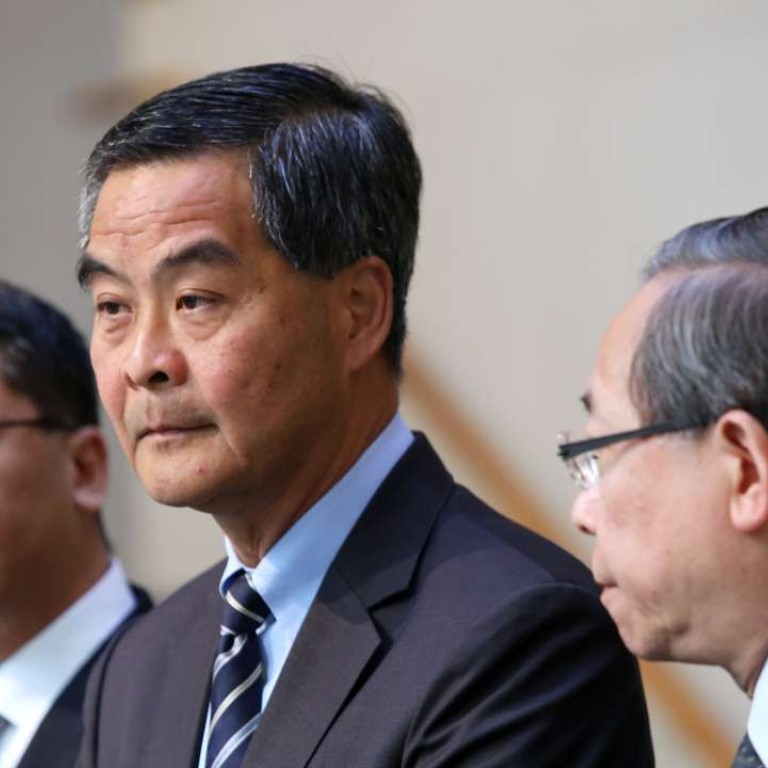
Leung Chun-ying confirms Beijing talks over notification mechanism for Hongkongers detained in China
Announcement of justice and security ministers’ one-day delegation to the capital comes more than two weeks after booksellers’ revelations of eight-month detention
Hong Kong’s justice and security ministers will make a whirlwind visit to Beijing today to open talks with mainland officials on how to fix their cross-border system of mutual notification that has been thrown in doubt by the bookseller controversy.
Confirming the Post’s report about the trip, Chief Executive Leung Chun-ying said the local delegation would discuss improvements to the communication mechanism and learn details about the case of Lam Wing-kee, the bookseller who disappeared last year and returned home recently, claiming he had been held without due process on the mainland for eight months.
The Hong Kong side was kept in the dark for months when Lam and four publishing associates vanished last year, raising doubts about the reciprocal notification system in place since 2001.
“It will be a comprehensive and in-depth review of the existing mechanism which has been in use for more than 10 years,” Leung said.
A notification unit under China’s Ministry of Public Security has to inform its counterpart under Hong Kong police if any of the city’s residents are detained anywhere on the mainland.
At issue is whether provinces other than neighbouring Guangdong are following the system and whether their compliance should be more formally binding.
Asked if the Hong Kong delegation would seek information on the “central special investigation unit” that Lam has identified as responsible for nabbing him after he crossed into Shenzhen last October, Leung said: “I have not heard of the [unit] ... We do not rule out at this stage any particular aspect that exists in this mechanism.”
Democratic Party lawmaker James To Kun-sun, who has been helping Lam, criticised Leung’s response, saying: “The notification system should encompass all official detention, including party organs such as the unit.”
The eight-hour trip led by Secretary for Justice Rimsky Yuen Kwok-keung and Secretary for Security Lai Tung-kwok will feature meetings with representatives of the Ministry of Public Security and the State Council’s Hong Kong and Macau Affairs Office (HKMAO).
The chief executive would only reveal one issue slated for discussion: the time limit for a notification to be made. Currently, the limit is set at 14 days after an arrest is made.
To urged the visiting officials to press for details about two mainland agents Lam claimed had followed him into Hong Kong. Any mainland agents found to have acted outside their jurisdiction should be made accountable in order to restore Hongkongers’ confidence, the lawmaker said.
Former security minister Regina Ip Lau Suk-yee agreed that the scope of notification could be enlarged while the mechanism needed more promotion.
Ip and To also called on Beijing to allow officials from the city to visit Hongkongers detained across the border.
The official trip to the capital takes place two weeks after Leung wrote to the central government to relay Hongkongers’ worries sparked by Lam’s claims.
The chief executive has said he wants to see the cross-border notification system to be on par with what Hong Kong has arranged with foreign countries.
Acting police chief Wong Chi-hung, Director of Immigration Erick Tsang Kwok-wai and customs boss Roy Tang Yun-kwong are in the delegation, which is expected to meet the media tomorrow morning.
HKMAO director Wang Guangya raised the stakes over the weekend by accusing Lam of harming the “one country, two systems” policy of governing Hong Kong, as he had sold books banned on the mainland because they featured criticism and gossip about China’s leaders.
“In terms of the political relationship, the mainland is superior while Hong Kong is inferior, so there is nothing one can do if [the mainland] does not abide by the notification system,” said China watcher Ching Cheong, a journalist previously jailed on the mainland for spying.

